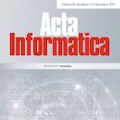Population protocols [Angluin et al., PODC, 2004] are a model of distributed computation in which indistinguishable, finite-state agents interact in pairs to decide if their initial configuration, i.e., the initial number of agents in each state, satisfies a given property. In a seminal paper Angluin et al. classified population protocols according to their communication mechanism, and conducted an exhaustive study of the expressive power of each class, that is, of the properties they can decide [Angluin et al., Distributed Computing, 2007]. In this paper we study the correctness problem for population protocols, i.e., whether a given protocol decides a given property. A previous paper [Esparza et al., Acta Informatica, 2017] has shown that the problem is decidable for the main population protocol model, but at least as hard as the reachability problem for Petri nets, which has recently been proved to have non-elementary complexity. Motivated by this result, we study the computational complexity of the correctness problem for all other classes introduced by Angluin et al., some of which are less powerful than the main model. Our main results show that for the class of observation models the complexity of the problem is much lower, ranging from ${\Pi}_2^p$ to PSPACE.
翻译:人口协议[Angluin等人,PoDC, 2004] 是一个分布式计算模型,在这个模型中,无法区分的有限国家代理人对一对子进行互动,以确定其初始配置是否正确,即每个州的初始代理人数目是否满足给定财产。在一份重要论文中,Angluin等人根据其通信机制对人口协议进行了分类,并对每一类(即他们能够决定的[Angluin等人,分布式计算,2007])的特性的表达力进行了详尽的研究。在本文中,我们研究了人口协议的正确性问题,即某一协议是否决定给定财产。上一份论文[Esparza等人,Acta Informatica, 2017年]表明,这一问题对于主要的人口协议模式模式来说是可以分解的,但至少与Petrii Net的可及性问题一样,后者最近被证明具有非核心复杂性。我们研究的结果,我们研究的是,安格鲁公司主要观测结果中最薄弱的模型的等级的计算复杂性比其他类别都要低。





